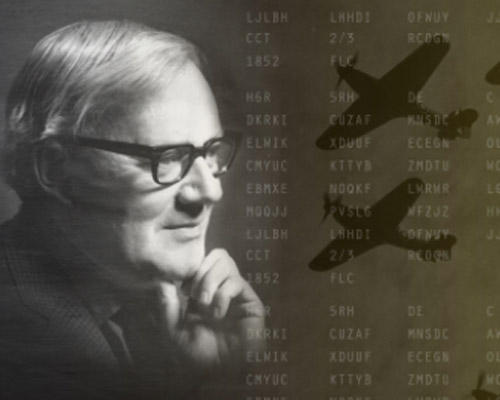National Philanthropy Day
World War II code breaker inspires endowed scholarship
William Tutte (DMath ’87) kept a secret for more than 50 years: a secret that is considered to be one of the greatest intellectual achievements of World War II.

The war was in full swing when the 24-year-old math genius was invited to Bletchley Park to work for the British Intelligence Agency. There, he helped decipher codes which would eventually reveal Hitler’s top-secret military communications. Tutte’s contribution is widely thought to have saved millions of lives and significantly shortened the war. But, he was forbidden to ever speak of his contribution.
Born in England in 1917, Tutte showed an early talent for math and science. He was just 10 years old when he did extraordinarily well on an exam, and was awarded a scholarship to attend high school. Unfortunately, the scholarship wasn’t enough. The family could not afford transportation for the daily 36-mile round trip to the high school. The scholarship was declined, and Tutte stayed home.
The following year, Tutte wrote the exam again. Once again, he scored top marks. This time, a scholarship was accompanied by the gift of a bicycle. Each day Tutte rode his bike to his new high school and back. He excelled in his studies, and was accepted into Cambridge University and then Trinity College.
All along the way, Tutte’s education was supported by scholarships and grants. Without philanthropic investment, education might well have been a road not taken by Tutte.
After Bletchley Park, he quietly got on with his life, pursuing graduate studies in math, then moving to Canada in 1948 to take a job with the University of Toronto. In 1962, he joined the University of Waterloo’s fledgling Faculty of Mathematics to become one of the first members of the Department of Combinatorics & Optimization. His presence helped establish the identity and reputation of the University. Tutte retired in 1985, but maintained his connection to Waterloo as a professor emeritus.
It wasn’t until the 1990s that stories of Tutte’s extraordinary role in the Second World War began to circulate. The news led to him being named to the Order of Canada in 2001, just a short time before his death in 2002 at age 84.
At a ceremony last year to commemorate the Faculty’s 50th anniversary and what would have been Tutte’s 100th birthday, the campus road connecting the math buildings was named William Tutte Way.
At the event, Stephen Watt, Dean of the Faculty of Mathematics, acknowledged “those who ensured that Tutte’s academic journey was not cut short. It is my hope that the students who make their way along William Tutte Way today, hurrying to their classes and exams, and running to catch up to a future they haven’t even envisioned yet, will have the same opportunities to change the course of history, for the betterment of the world, just as Tutte did.”
In attendance at the event was a small group of six donors who decided to endow an award in Tutte’s honour — the William Tutte Centenary Undergraduate Scholarship. The first scholarship will be awarded this fall to the student with the highest average in year two, three, or four of the Combinatorics & Optimization program.
Dean Watt said of the scholarship, “We feel that through this award, complimented by the existing William Tutte Post-Graduate Scholarship, we can ensure Tutte’s greatest successes do not lie in the past. As the Faculty of Mathematics continues to push forward, the young women and men who join Tutte on his incredible journey will blaze great trails of innovation that the world has not seen — yet.”




